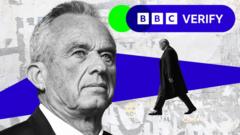
Robert F Kennedy Jr has been nominated by Donald Trump to be the next US health secretary, a position overseeing medical research, food safety, and public welfare programs. In a recent NPR interview, Kennedy outlined three key instructions from Trump: removing “corruption” from health agencies, returning them to “evidence-based science and medicine”, and ending the “chronic disease epidemic”.
However, Kennedy’s nomination has raised significant concerns among medical experts due to his controversial views on several health-related issues:
Vaccines:
Kennedy claims he wants to improve vaccine safety science, asserting there are “huge deficits” in current research. Despite denying being anti-vaccination, he has repeatedly made widely debunked claims about vaccine harm. Most notably, he has claimed that “autism comes from vaccines” – a theory originally popularized by discredited UK doctor Andrew Wakefield. Multiple international studies have conclusively found no link between vaccines and autism. Medical experts warn that his approach could potentially undermine vaccination programs and put public health at risk.
Fluoride:
Kennedy has long campaigned against water fluoridation, claiming it is associated with various health issues like arthritis, bone fractures, and neurodevelopmental disorders. While he cited a California judicial ruling suggesting further investigation into potential fluoride risks, experts like Prof Avijit Banerjee from King’s College London emphasize that the fluoride levels in water systems are too low to cause significant harm.
Ultra-Processed Foods:
On a more supported note, Kennedy has been vocal about concerns regarding ultra-processed foods (UPFs). He argues that UPFs are driving the obesity epidemic and potentially linked to various medical conditions. While there’s growing evidence that these foods aren’t beneficial, experts caution that direct causation hasn’t been definitively established.
COVID-19 Claims:
Kennedy made highly controversial statements about COVID-19, claiming the virus was “targeted to attack Caucasians and black people” while suggesting certain ethnic groups were more immune. These claims were strongly rejected by health specialists, who emphasized that the virus does not target specific ethnicities.
Experts like Prof Melinda Mills from Oxford University’s Nuffield Department of Population Health stressed that differences in COVID-19 infections and deaths are related to socioeconomic factors and living conditions, not genetic targeting.
Despite the scientific community’s widespread criticism of many of his claims, Kennedy continues to maintain his positions. His potential appointment as health secretary has raised significant concerns about the potential impact on evidence-based medical policy and public health initiatives.
The nomination highlights the ongoing tension between scientific consensus and alternative health narratives in contemporary political discourse.









